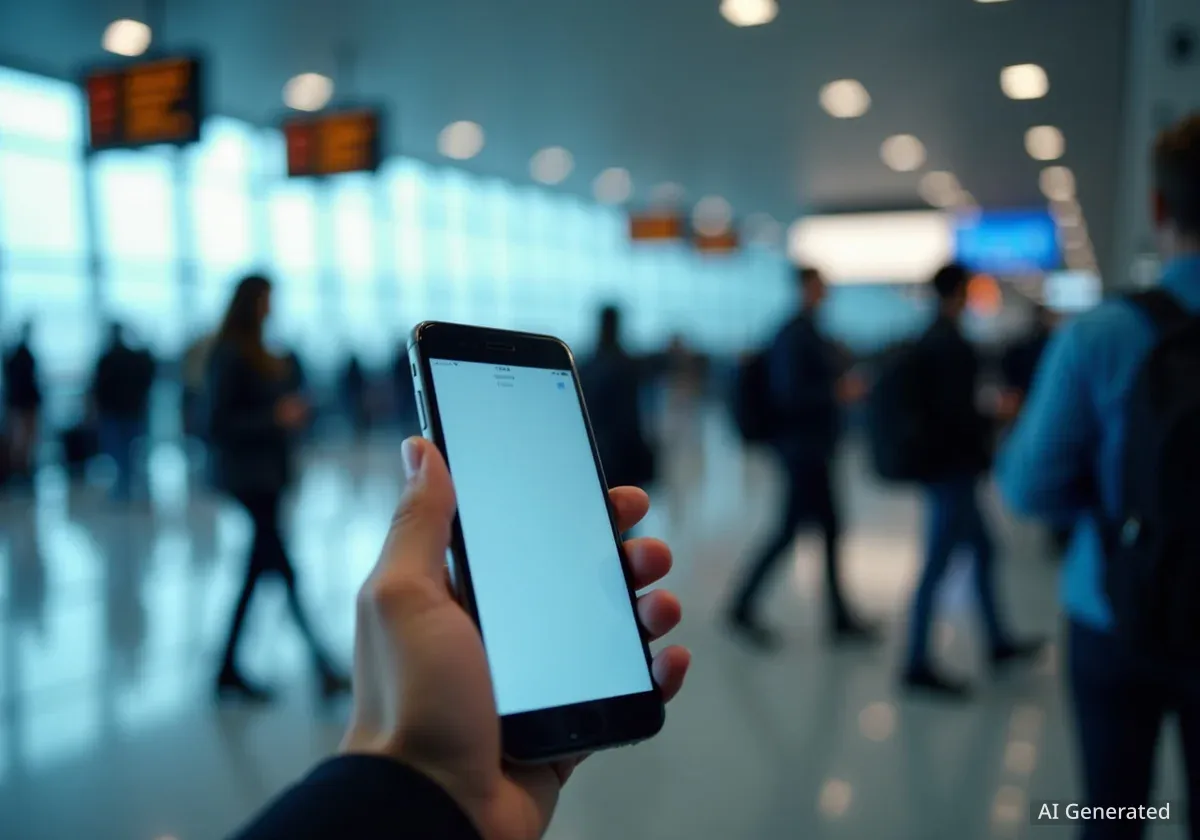Brussels Airport continues to face significant operational challenges today, Monday, and into Tuesday following a cyberattack that targeted its external service provider, Collins Aerospace. Travelers are experiencing flight cancellations and delays, with airport authorities working to manage the impact on scheduled departures and arrivals.
Key Takeaways
- Cyberattack on Collins Aerospace caused technical issues at Brussels Airport.
- Disruptions, including cancellations and delays, are expected through Tuesday.
- Manual check-in processes led to slower operations over the weekend.
- Passengers advised to check flight status and use online check-in if possible.
- Most flights are still operating, but major European hubs are affected.
Ongoing Impact on Flights
The technical problems began Friday evening, affecting check-in and boarding systems. A spokesperson for Brussels Airport confirmed that disruptions would extend through Monday and Tuesday. On Monday, 40 of 276 scheduled departures were canceled. Nine other flights experienced delays. For Tuesday, approximately one in ten flights is still expected to be canceled.
The airport stated, "The service provider is actively working on the issue and trying to resolve the problem as quickly as possible. At the moment, it is still unclear when the issue will be resolved." This situation is particularly challenging for EU leaders planning to travel to New York for a UN General Assembly meeting this week.
Key Numbers
- Monday Departures: 277 scheduled, 40 canceled.
- Monday Arrivals: 277 scheduled, 23 canceled.
- Tuesday Forecast: About 10% of flights canceled.
- Weekend Operations: 85% of departing flights operational.
Advice for Travelers
Travelers are strongly advised to verify their flight status before heading to the airport. Brussels Airlines recommends passengers check in online from home if their flight is confirmed. This is because airline-specific systems were not affected by the cyberattack.
"Unlike the airport's systems, the airlines' own systems were not affected by the cyberattack. Therefore, those who check in themselves will experience minimal disruption," a Brussels Airlines spokesperson said.
Over the weekend, many passengers used manual check-in, which involved handwritten boarding passes. This method significantly slowed down the process and led to longer delays. For flights within the Schengen zone, passengers should arrive two hours before departure. For non-Schengen destinations, a three-hour arrival window is recommended. "Arrive on time and continue to monitor the information channels for updates," the spokesperson added.
Manual Processes and Cancellations
On Monday, check-in procedures continued to be alternative. Airport spokesperson Ihsane Chioua Lekhli told Belga News Agency that staff were using "pen and paper, as well as laptops and iPads." Online check-in remained available, and passengers could print their own baggage labels at kiosks.
The canceled flights primarily targeted major European aviation hubs. These include cities like London, Munich, and Frankfurt. Brussels Airlines operates multiple daily flights to these destinations. This frequency allows the airline to offer alternative travel options to affected passengers more quickly.
Background on Collins Aerospace
Collins Aerospace is an American company that develops systems for passenger check-in and boarding used by numerous airports globally. The cyberattack on their systems has had widespread implications for various European airports, though Brussels Airport seems to be experiencing a more pronounced impact.
Weekend Disruptions and Resilience
The weekend saw a higher number of cancellations and delays. On Saturday, 25 of 234 scheduled departures were canceled, along with 13 arrivals. On Sunday, authorities requested airlines to cancel half of their planned flights. Ultimately, 50 of 257 departures and 35 arrivals were canceled.
Despite these challenges, Brussels Airport reported that 85% of departing flights were operational over the weekend. This was achieved through staggered flight schedules, planned delays, additional staff, and the continued functionality of online check-in and self-bag drop kiosks. Charleroi Airport, another major Belgian airport, reported no disruptions related to the cyberattack.
Nature of the Cyberattack
The exact nature of the cyberattack was not immediately clear. RTX, the parent company of Collins Aerospace, described it as a "cyber-related disruption" in a statement to Reuters. On Monday, the European Union Agency for Cybersecurity (ENISA) confirmed that the attack involved ransomware. Ransomware typically works by encrypting system content, blocking access, and then demanding a payment to restore functionality.
Brussels Airport is not the only facility affected. London's Heathrow Airport and Berlin Brandenburg Airport also experienced similar technical issues. However, Brussels Airport has faced more significant operational challenges compared to other European airports impacted by this incident.
Passenger Rights and Compensation
Consumer protection organization Testachats has reminded travelers of their rights. Passengers whose flights are canceled due to the cyberattack are entitled to either a free alternative flight or a full refund for their ticket. This protection applies under EU regulations.
However, airlines are not required to pay additional financial compensation. The cancellations are considered an event of force majeure, meaning an unforeseeable circumstance beyond the airline's control. For passengers experiencing flight delays, airlines must provide assistance. This includes refreshments. If an overnight stay becomes necessary due to a delay, the airline is responsible for covering hotel accommodation costs.
- Cancellations: Free alternative flight or full refund.
- Delays: Airline assistance (refreshments, hotel if overnight).
- Financial Compensation: Not typically required due to force majeure.





